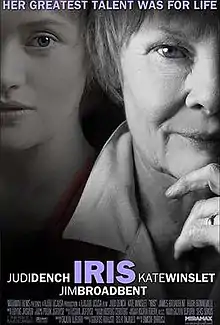Iris (2001 film)
Iris is a 2001 biographical drama film about novelist Iris Murdoch and her relationship with her husband John Bayley. Directed by Richard Eyre from a screenplay he co-wrote with Charles Wood, the film is based on Bayley's 1999 memoir Elegy for Iris.[3] Judi Dench and Jim Broadbent portray Murdoch and Bayley during the later stages of their marriage, while Kate Winslet and Hugh Bonneville appear as the couple in their younger years. The film contrasts the start of their relationship, when Murdoch was an outgoing, dominant individual compared to the timid and scholarly Bayley, and their later life, when Murdoch was suffering from Alzheimer's disease and tended to by a frustrated Bayley in their North Oxford home in Charlbury Road. The beach scenes were filmed at Southwold in Suffolk, one of Murdoch's favourite haunts.
| Iris | |
|---|---|
 Theatrical release poster | |
| Directed by | Richard Eyre |
| Screenplay by |
|
| Based on | Elegy for Iris by John Bayley |
| Produced by | |
| Starring | |
| Cinematography | Roger Pratt |
| Edited by | Martin Walsh |
| Music by | James Horner |
Production companies |
|
| Distributed by | |
Release dates |
|
Running time | 90 minutes[1] |
| Countries |
|
| Language | English |
| Budget | $5.5 million |
| Box office | $16.2 million[2] |
The film had its world premiere in Los Angeles on 14 December 2001, followed by a theatrical release in the United Kingdom on 18 January 2002 and in the United States on 29 March. It grossed $16 million on a $5.5 million budget and received positive reviews, with praise towards the performances. For his role as Bayley, Broadbent won Best Supporting Actor at the 74th Academy Awards, with Dench (Best Actress) and Winslet for (Best Supporting Actress) also receiving nominations.
Plot
When the young Iris Murdoch meets fellow student John Bayley at Somerville College, Oxford, he is a naive virgin easily flummoxed by her libertine spirit, arch personality, and obvious artistic talent. Decades later, little has changed and the couple keep house, with John doting on his more famous wife. When Iris begins experiencing forgetfulness and dementia, however, the devoted John struggles with hopelessness and frustration,[3] and becomes her carer, as his wife's mind deteriorates from the ravages of Alzheimer's disease.[4]
Cast
- Judi Dench as Iris Murdoch[3]
- Kate Winslet as young Iris[3]
- Jim Broadbent as John Bayley[3]
- Hugh Bonneville as young John[3]
- Penelope Wilton as Janet Stone
- Juliet Aubrey as young Janet
- Timothy West as Maurice
- Samuel West as young Maurice
- Siobhan Hayes as Checkout girl
- Kris Marshall as Dr Gudgeon
Reception
Review aggregator Rotten Tomatoes reported that 79% of 110 critics gave the film a positive review, with an average rating of 7.1/10. The website's critical consensus states, "A solidly constructed drama, Iris is greatly elevated by the strength of its four lead performances."[5] Metacritic assigned the film a weighted average score of 76 out of 100, based on 30 critics, indicating "generally favorable reviews".[6]
Awards and nominations
References
- "IRIS (15)". British Board of Film Classification. 13 December 2001. Retrieved 10 July 2015.
- "Iris (2001)". Box Office Mojo. IMDb. 17 May 2002. Retrieved 10 July 2015.
- Peter Bradshaw (18 January 2002). "Iris". The Guardian. Retrieved 14 January 2020.
- "Iris". TimeOut. 10 September 2012. Retrieved 14 January 2020.
- "Iris (2001)". Rotten Tomatoes.
- "Iris (2001)". Metacritic.
- "The 74th Academy Awards (2002) Nominees and Winners". Academy of Motion Picture Arts and Sciences. AMPAS. Archived from the original on 9 November 2014. Retrieved 19 November 2011.
- "PRIZES & HONOURS 2002". berlinale.de. Archived from the original on 15 October 2013. Retrieved 9 June 2014.
- "BAFTA Awards: Film in 2002". BAFTA. 2002. Retrieved 16 September 2016.
- "The BFCA Critics' Choice Awards :: 2001". Broadcast Film Critics Association. 11 January 2002. Archived from the original on 7 January 2013. Retrieved 16 March 2011.
- "EFA Night 2002". European Film Awards. Retrieved 25 June 2022.
- "Iris – Golden Globes". HFPA. Retrieved 5 July 2021.
- "Past Winners & Nominees". Humanitas Prize. Retrieved 11 June 2022.
- "1997 Sierra Award Winners". 13 December 2021. Retrieved 31 January 2022.
- "The Annual 27th Los Angeles Film Critics Association Awards". Los Angeles Film Critics Association. Retrieved 24 August 2021.
- "2001 Award Winners". National Board of Review. Retrieved 5 July 2021.
- "2001 New York Film Critics Circle Awards". New York Film Critics Circle. Retrieved 5 July 2021.
- "NYFCO AWARDS 2001-2019". New York Film Critics Online. Retrieved 15 May 2021.
- "International Press Academy website – 2002 6th Annual SATELLITE Awards". Archived from the original on 13 February 2008.
- "The 8th Annual Screen Actors Guild Awards". Screen Actors Guild Awards. Archived from the original on 1 November 2011. Retrieved 21 May 2016.
Kalpaklı, Fatma. “Representation of Old Age and Pain in Iris”, Journal of Narrative and Language Studies. Vol. 5, No.9 (2017): December. 30.12.2017. ISSN: 2148-4066. 65-72. http://www.nalans.com/index.php/nalans.
.jpg.webp)
